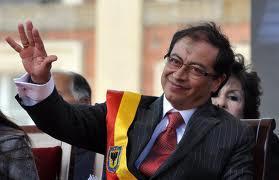
via ABC News on the attempts of Mayor Gustavo Petro to do something about the murders in Bogota.
... an experimental ban on gun-wielding in public.
The only people authorized to carry weapons during the 90-day trial that began Wednesday are active and retired police and soldiers, bodyguards of diplomats, politicians, judges and prosecutors, armored car guards, gun club members and hunters.
If the experiment does produce a drop in Bogota's murder rate, which was 23.6 per 100,000 inhabitants in 2010, Petro said he will consider extending the ban.
Not everyone agrees:
Orlando Parada, a center-right politician on the city council, is skeptical about how effective the ban will be, saying the at least 160,000 registered weapons in Bogota are not the problem.One of the detractors said it won't affect the criminals but it might help with the drunken-brawl-type shootings.
"It's not the definitive way to confront violence and insecurity in Bogota, because legal weapons only commit a small proportion of crimes" in the capital, Parada said.
There are no official estimates of how many illegal weapons exist in Bogota, although Petro said he believes the number easily exceeds the amount of legal weapons.
Actually this is something I agree with. But I'd add to the drunken brawls, the road rage and some of the domestic violence.
The pro-gun crowd will surely say the criminal shootings will increase because of all the good guys who are disarmed. If they're right, Bogota should soon look like some of those other Colombian cities or even Carracas.
Bogota's murder rate is low when compared with much of provincial Colombia, where violence persists in epidemic proportions, perpetrated by leftist rebels, far-right militias and drug traffickers.
In the southeastern Guaviare region, the murder rate is 101.6 per 100,000 inhabitants, while in Arauca, on the border with Venezuela, the rate is 95.7 per 100,000, according to Colombia's chief coroner's office.
As a country, Colombia's murder rate of 38.3 per 100,000 inhabitants for 2010 is far below such Latin American nations as Honduras and El Salvador, where it was 82.1 and 66, respectively, according to the United Nations.
It also was well below the 48 per 100,000 rate of Venezuela, but higher than Mexico's 18 per 100,000.
What do you think? Would these efforts by the mayor of Bogota have produce no good results or even make matters worse? Or will the murder rate go down, as they hope?
What's your opinion? Please leave a comment.
